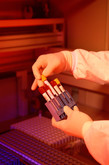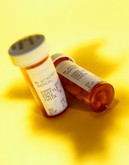Biosimilars
Bionomics of biosimilars – Indian opportunities
As reported by Ms Nayantara Som in BioSpectrumIndia of 13 January 2010, biosimilars are said to be the next big cash cow for India. However, players have many knots to untangle before they can have a firm grip over the economics of the market.
Bionomics of biosimilars – India’s next big cash cow?
As reported by Ms Nayantara Som in BioSpectrumIndia of 13 January 2010, biosimilars are said to be the next big cash cow for India. According to her, however, players have many knots to untangle before they can have a firm grip over the economics of the market.
FDA accepts Teva’s biosimilar filgrastim BLA, Amgen not
The US FDA has accepted Teva‘s application to sell a biosimilar version of Amgen's Neupogen (filgrastim), although the biotech giant is working to block the move in court.
XM02, a granulocyte colony-stimulating factor (G-CSF), is designed to treat severe neutropenia, a haematological disorder characterised by an abnormally low number of white blood cells. If approved, the drug would be marketed under the name Neutroval by US pharma company Hospira, which in 2009 acquired worldwide rights to the new version in a deal that also saw it gain manufacturing capacity for filgrastim and pegfilgrastim - a long-acting version of the drug marketed by Amgen as Neulasta. The worldwide market for Neulasta and Neupogen currently stands at more than US$2 billion.
Abbott: Non-responding RA patients with anti-infliximab antibodies may switch to less immunogenic anti-TNF
In the race for biosimilar/biobetter monoclonal antibodies (MAbs), it is interesting to compare originator MAbs, e.g. mouse-human chimeric infliximab (Remicade) of Johnson & Johnson’s Centocor versus Abbott’s fully human – and thus less immunogenic – adalimumab (HUMIRA).
Celtic Pharma invests in Cantab, PolyTherics for ‘biosuperiors’
As reported by Genetic Engineering & Biotechnology News on 25 and 26 January 2010, Celtic Pharma Holdings is making an initial £5 million (about $8.1 million) investment in Cantab Biopharmaceuticals, Cambridge, UK. Cantab is wholly owned by the Celtic Pharma Holdings II LP (CP2) fund. The new CP2 funding will be spread over three years and will support the development of the firm’s first clinical-stage so-called ‘biosuperior’ biologic in haematology.
Korean biopharma: special programme for biosimilars
As reported by Narayan Kulkami, Singapore, in BioSpectrum Asia Edition on 18 January 2010, the Korean biopharmaceutical sector gets support for biosimilars and/or biobetters.(see also Korean biopharma gets support for biosimilars/biobetters)
Korean biopharma gets support for biosimilars/biobetters
As reported by Narayan Kulkami, Singapore, in BioSpectrum Asia Edition on 18 January 2010, the [South] Korean biopharmaceutical industry continues to get the attention of the global players, mainly because the Korean government in 2009 identified ‘biopharmaceutical and medical equipment’ as one of the future engines for economic growth. The life sciences industry in Korea consists of close to 2000 companies including 580 pharmaceutical companies and 600 biotech companies. (see also Korean biopharma: special programme for biosimilars)
ADCC enhancement technologies for monoclonal antibodies
In a 2009 article by Dr Cheng Liu, founder and CEO of Eureka Therapeutics in California, and Andreia Lee in Trends in Bio/Pharmaceutical Industry on Antibody Therapeutics, it is stated that ADCC (Antibody Dependent Cell-mediated Cytotoxicity) enhancement is a key strategy for improving therapeutic antibody drug efficacy against cell-surface targets in cancer and chronic inflammation. It takes advantage of patients’ innate immune cells to kill target cells. The functions are primarily triggered through direct interaction of the Fc domain of human immunoglobulin (in most cases IgG1) with the corresponding receptors. Therapeutic antibodies with enhanced ADCC are anticipated to have a clinical advantage owing to increased specific lysis of target cells, such as cancer cells, mediated by Fc receptors present on natural killer cells, macrophages, and other immune cell types.
Biosimilar EPO and infliximab, adalimumab get formal Japanese approval
As reported by Scrip on 21 January 2010, a large batch of new products has received final approval from Japan's ministry of health, labour and welfare, including a biosimilar erythropoietin. These and the other products given formal approval by the ministry received positive recommendations in November and December 2009.
Xencor: Via Fc engineering enhanced antibody half-life improves in vivo activity
Improved affinity for the neonatal Fc receptor (FcRn) is known to extend antibody half-life in vivo. However, this has never been linked with enhanced therapeutic efficacy. Mr Jonathan Zalevsky and Dr John Desjarlais et al. of Xencor at Monrovia, CA, USA, studied if such enhanced antibody half-life improves in vivo activity, as published online in Nature Biotechnology on 17 January 2010.











